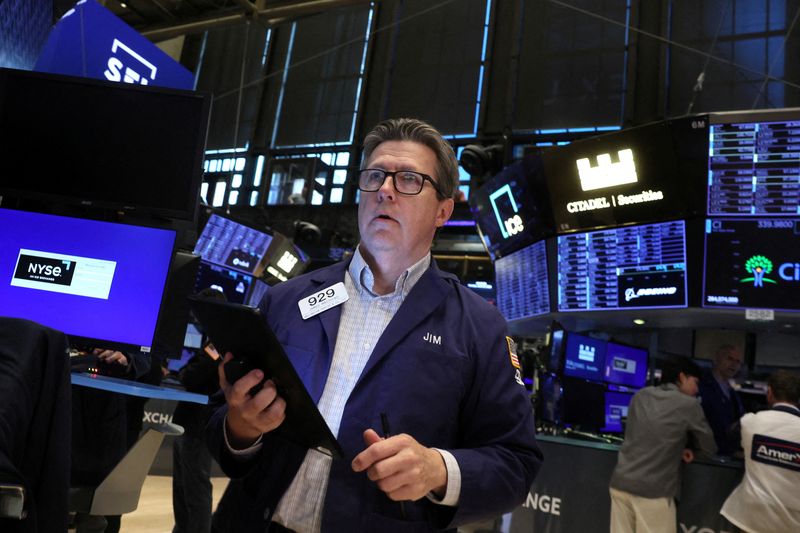By Nell Mackenzie, Yoruk Bahceli
LONDON (Reuters) -A meltdown in world equity markets in recent days is more reflective of a wind-down of carry trades used by investors to juice their bets than a hard and fast shift in the U.S. economic outlook, analysts say.
While Friday's weaker-than-expected U.S. jobs data was the catalyst for the market sell-off, with Japan's blue-chip Nikkei index on Monday suffering its biggest one-day rout since the 1987 Black Monday selloff, the employment report alone wasn't weak enough to be the main driver of such violent moves, they added.
Instead, the answer likely lies in a further sharp position unwind of carry trades, where investors have borrowed money from economies with low interest rates such as Japan or Switzerland, to fund investments in higher-yielding assets elsewhere.
They have been caught out as the Japanese yen has rallied by more than 11% against the dollar from 38-year lows hit just a month ago.
"In our assessment a lot of this (market sell-off) has been down to position capitulation as a number of macro funds have been caught the wrong way around on a trade, and stops have been triggered, initially starting with FX and the Japanese yen," said Mark Dowding, chief investment officer at BlueBay Asset Management, referring to pre-determined levels that trigger buying or selling.
"We don't see evidence in data that's saying we're looking at a hard landing," he added.
One Asian-based investor, who asked not to be identified, said that some of the biggest systematic hedge funds that trade in and out of stocks based on signals from algorithms, started selling equities when last week's surprise Bank of Japan rate hike sparked expectations for further tightening.
While exact numbers and the specific positioning shifts underlying the moves are hard to come by, analysts suspected that crowded positions in U.S. tech stocks, funded by carry trades, explain why they are suffering the most.
By 1423 GMT on Monday, the tech-heavy U.S. Nasdaq stock index was down over 8% so far in August, versus 6% for the broader S&P index.
Carry trades, boosted by years of ultra-easy Japanese monetary policy, prompted a boom in cross-border yen borrowing to fund trades elsewhere, ING said.
Bank for International Settlements data suggests cross-border yen borrowing has increased by $742 billion since the end of 2021, the bank noted.
"It's a yen-funded carry unwind and Japanese stock unwind," said Tim Graf, head of macro strategy for Europe at State Street (NYSE:STT) Global Markets. "Our positioning metrics show investors overweight Japanese stocks. They were underweight yen. They're no longer underweight yen."
Speculators have cut bearish bets against the yen aggressively in recent weeks, bringing the net short position in the yen to $6.01 billion, its smallest since January, down from April's seven-year high of $14.526 billion, most recent weekly data from the U.S. markets regulator shows.
"You can't unwind the biggest carry trade the world has ever seen without breaking a few heads," said Societe Generale (OTC:SCGLY)'s chief currency strategist Kit Juckes.
HEDGE FUND PAIN
As hedge funds typically fund their bets through borrowing, their adjustments are exacerbating market moves, some investors said.
Banks give hedge funds leverage, essentially a loan to fund investing, which amplifies hedge fund returns but can also increase losses.
A note sent by Goldman Sachs to clients on Friday showed that gross leverage from Goldman Sachs prime brokerage, or the total amount that hedge funds have borrowed, declined in June and July, but still sits near five-year highs.
Last week marked the third consecutive week that hedge funds' bets that stocks will fall outpaced the addition of bets that they will rise, Goldman said in a separate note, saying one long position was added for every 3.3 short bets.
It added on Monday that as of the Asian close, Japan-focused hedge funds were down 7.6% in the past three trading sessions.
While macro funds may have been involved in currency trades relating to the yen, many stock-trading hedge funds, because of a June short selling ban in South Korea and regulatory headwinds against the same practice in China, had moved focus to Japan, investors said.
Analysts added there was room for further short-term pain as positions are unwound, but the market shake-up would be limited.
Traders now expect over 120 basis points of U.S. rate cuts by the end of the year, versus around 50 bps at the start of last week, and fully price in a hefty 50 bps September rate cut.

Such expectations may be overdone if upcoming data suggests the U.S. economy is likely to avoid a hard landing.
"We think it's really wrong to start fundamentally reassessing your view on the outlook here. Doing so is simply fitting a narrative to match the price action," said BlueBay's Dowding.
